If you’d like to drive more organic traffic to your website and watch your rankings soar, then you need to start with keyword research. But with so many tools available, finding the right one can feel challenging for those new to SEO (search engine optimization).
But here’s the good news: at WPBeginner, we’ve already done the heavy lifting. For over a decade, our team has been immersed in the world of keyword research, not just reading about tools, but actually using them day in and day out.
To help you pinpoint the tools that deliver real results, we’ve evaluated the leading keyword research tools trusted by SEO experts worldwide.
Whether you are a beginner or an SEO pro, this article will introduce you to the best keyword research tools for boosting your website’s visibility and ranking.

If you are in a hurry, then this handy table will show you our top picks:
| # | Keyword Research Tool | Best For |
|---|---|---|
| 1 | Semrush | The #1 keyword tool on the market |
| 2 | LowFruits | Finds low-competition keywords you can rank for |
| 3 | WPBeginner Keyword Generator | Free keyword research tool |
| 4 | AnswerThePublic | Free keyword research tool |
What Is a Keyword Research Tool?
A keyword research tool helps you find topic ideas that people are searching for on search engines like Google, Bing, Amazon, etc.
This helps you find content ideas that your customers are looking for. You can then plan your content strategy to cover those topics in your blog posts and landing pages.
Keyword research tools also help you see both seed keywords and long-tail keywords where your competitors are ranking at the top. You can then improve your content to target those keywords and steal their traffic.
Editor’s Note: We recommend using the All in One SEO plugin for WordPress along with one of the keyword research tools below for maximum ranking improvements.
How We Test and Review Keyword Research Tools
Over years of testing keyword research tools, we’ve identified the essential features users need to discover valuable keywords and improve their online visibility.
This practical experience allows us to thoroughly evaluate each tool and provide reliable recommendations. Here’s our testing process:
- Keyword Suggestion Relevance and Variety: We evaluate the quality and diversity of the keyword suggestions provided. We look for the tool’s ability to generate relevant long-tail keywords, identify trending topics, and offer a range of keyword types.
- User-Friendliness for All Skill Levels: We examine how user-friendly the tool is for users with varying levels of SEO knowledge, and whether both beginners can quickly grasp the basics and experienced users can efficiently utilize advanced features.
- Analytical Depth and Feature Range: We look at the depth of analysis and range of features offered by each tool. This includes competitor analysis, SERP analysis, and features for keyword grouping, and content planning.
- Value and Cost: We check if the tool is worth the money. For paid tools, we ask: “Is it worth the price?” For free tools, we ask: ‘Is it actually useful?’ We look at what you get for the cost, whether it’s free or paid, to see if it’s a good deal for different users.
Why Trust WPBeginner?
Since 2009, WPBeginner has been dedicated to SEO best practices and helping website owners succeed online. Our team actively uses keyword research tools daily to grow our online presence and guide our readers.
Based on our extensive hands-on testing, we recommend Semrush and LowFruits as top choices. However, we regularly test and reassess other keyword research solutions to ensure our recommendations remain accurate, unbiased, and genuinely helpful. To learn more, see our complete editorial process.
That being said, let’s take a look at the best keyword research tools for SEO that you can use.
1. Semrush

Semrush is a complete SEO tool suite to carry out keyword research and improve your SEO rankings.
Using the Keyword Overview tool, you can type in a keyword and get a full picture of everything you need to know. This includes how many people search for the keyword (monthly search volume), whether it’s growing in popularity or becoming less popular (the Trend), and much more.
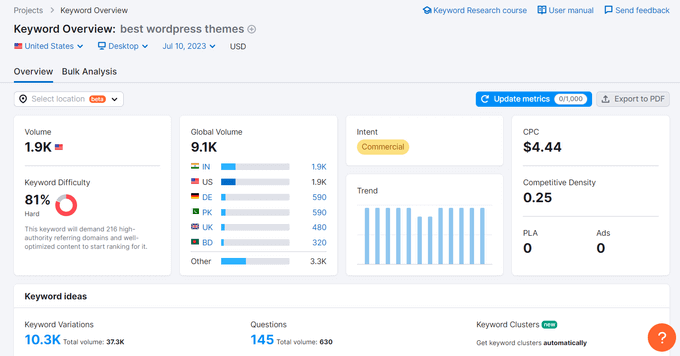
After scrolling down, you can also see a handy list of other similar keywords you might want to use, along with a list of organic search results, so you can find out where your competitors rank for the keyword. There’s also a section to see Google Ads that use that keyword in PPC advertising (pay-per-click ads).
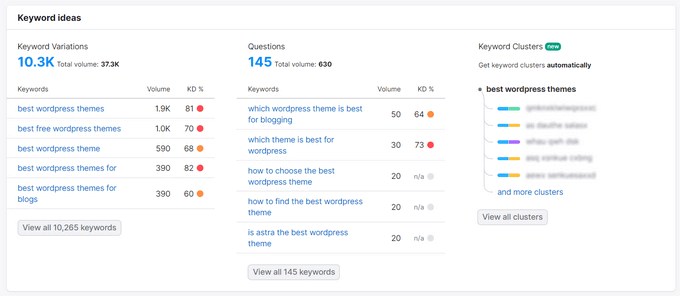
You can also type in any competitor’s website in the Domain Overview to see their organic search terms, keyword data, and other organic traffic metrics.
If you click on the Organic Research tab, you’ll be able to see relevant keywords, your competitor’s search engine ranking positions (serps), the traffic value (cpc), and more.
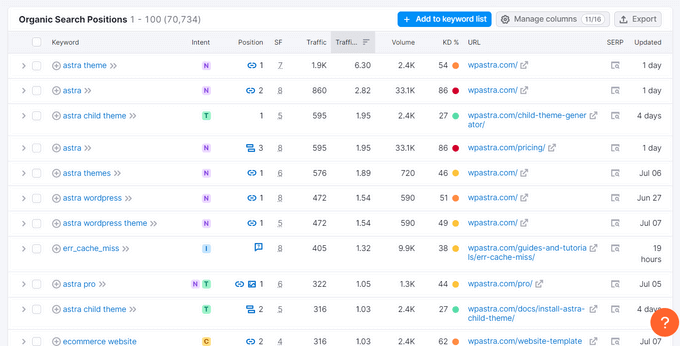
Semrush also integrates with the All in One SEO plugin to help you find additional related keywords right from WordPress.
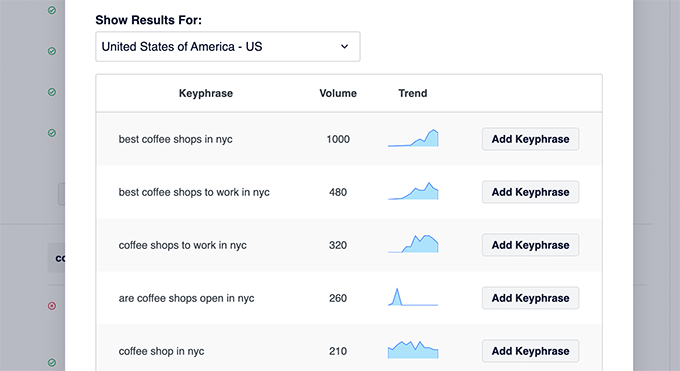
It even shows the search volumes and trends straight from the screen. Then, you can add the keywords to your content with the click of a button.
All the top marketers in the world rate Semrush as the #1 keyword research tool. Their full suite of tools can help you with content marketing, digital marketing, social media, and more.
What We Like About Semrush:
- Offers a wide range of tools beyond keyword research, including competitor analysis, site audit, rank tracking, and more.
- Provides extensive keyword metrics, search volume, keyword difficulty, and related keywords.
- Excellent for researching competitor keywords, strategies, and backlinks.
- Includes features for content planning, SEO writing assistance, and content performance tracking.
What We Don’t Like About Semrush:
- One of the more expensive keyword research tools on the market.
- Keyword data is still an estimate and not always perfectly accurate.
Why We Recommend Semrush: We recommend Semrush for serious website owners and marketing professionals who need an all-in-one SEO and competitive intelligence platform. It offers deep insights, comprehensive data, and a wide range of features.
2. LowFruits
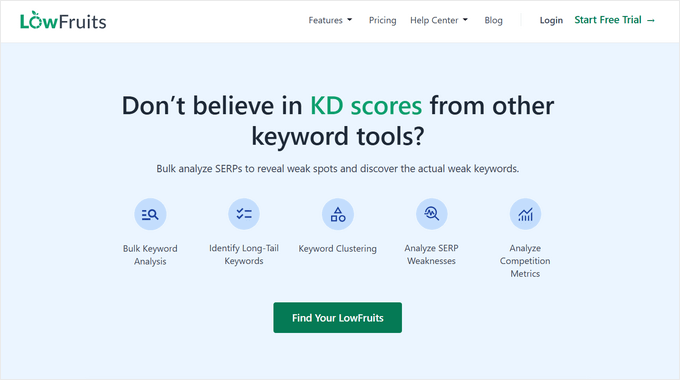
LowFruits is a powerful keyword research tool that allows you to discover low-competition, high-potential keywords that you can actually rank for.
The Keyword Finder (KWFinder) uses advanced algorithms to analyze Google’s autocomplete data and generate targeted long-tail keyword suggestions. Simply type in a keyword to find more valuable keywords and untapped ranking opportunities.
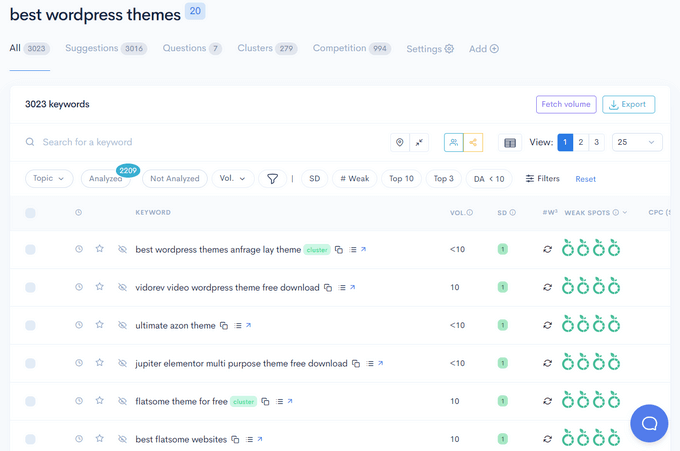
Aside from the usual insights like search volume and search difficulty, LowFruits also shows weak spots in the SERPs.
The SERP Analyzer feature extracts the top 10 Google search results for the keyword and identifies low domain authority websites that are ranking for it. This makes it easier for you to outrank competitors.
LowFruits can also help you build niche authority with its Keyword Clustering feature. Keyword clustering is the process of grouping similar keywords together. You can target these related keywords on a page to increase its visibility in search engines.
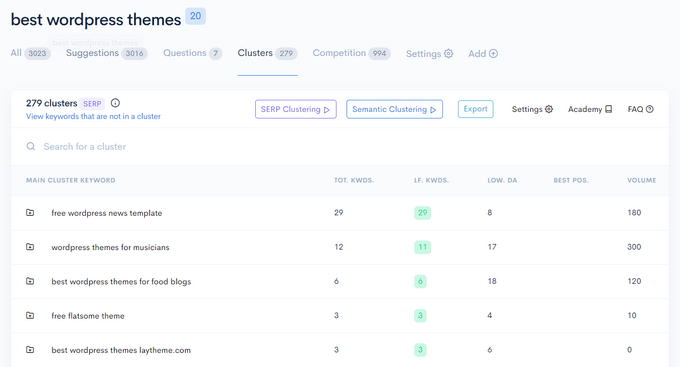
You can view SERP Clusters, which are similar keywords by search intent, or Semantic Clusters, which group keywords based on their word structure.
In addition, LowFruits comes with a handful of other helpful tools. This includes a Rank Tracker to monitor your keyword rankings over time, Domain Explorer to identify backlink opportunities, Sitemap Extractor to see the content structure of your competitors’ websites, and more.
What We Like About LowFruits:
- Designed to find long-tail keywords with low SEO difficulty, making it easier to rank.
- Analyzes search engine results pages to identify weak spots and ranking opportunities.
- Offers a more affordable pricing structure, especially for smaller websites and bloggers.
- Simple and intuitive interface, making it accessible for beginners.
- Excellent for quickly finding rankable keywords when starting out or targeting niche markets.
What We Don’t Like About LowFruits:
- Doesn’t offer the same depth and breadth of keyword data as tools like Semrush.
- Primarily geared towards long-tail keyword research, and is less suitable for broad, high-volume keyword strategies.
Why We Recommend LowFruits: We recommend LowFruits for bloggers, small business owners, and niche website creators who are focused on finding easy-to-rank, long-tail keywords.
3. WPBeginner Keyword Generator
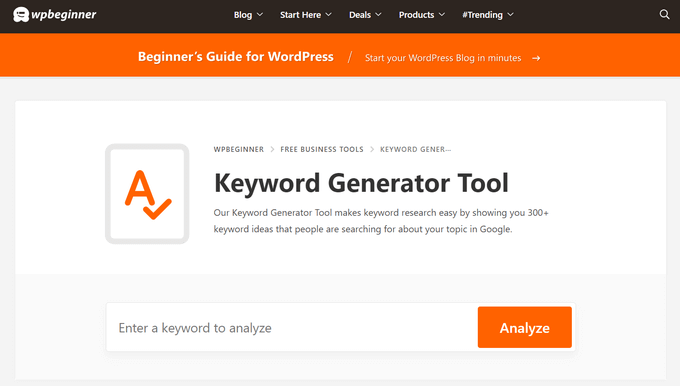
WPBeginner Keyword Generator is a completely free tool that lets you easily discover new keyword ideas for your WordPress blog or website.
Simply enter your main topic keyword into the tool and click the ‘Analyze’ button. The tool will then generate 300+ new keyword ideas from Google that you can browse or download as a CSV file.
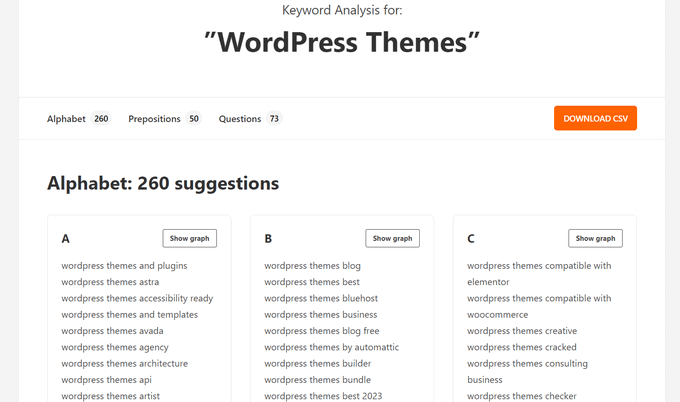
The keyword ideas are organized into 3 sections:
- Alphabet – Related keywords that people search for in Google in alphabetical order.
- Prepositions – Related keywords that include prepositions like for, near, is, to, etc.
- Questions – Related long tail keywords in the form of questions.
To see keyword ideas organized as an SEO topical entity graph, simply click the ‘Show graph’ button in any section. You can also copy the SVG file of the graph to your clipboard.
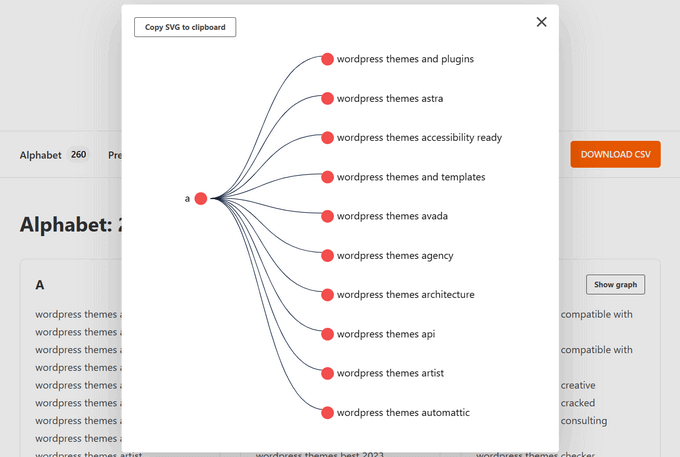
Aside from the Keyword Generator tool, WPBeginner also offers a free Keyword Density Checker. You can use this tool to find the most optimized keywords in any content to fix over optimization and keyword stuffing.
You can also use the Keyword Density Checker to discover what keywords your competitors are optimizing for by simply entering their URLs into the tool.
The best part about the WPBeginner tools is that you don’t have to create an account to use them and there are no daily limits.
What We Like About WPBeginner Keyword Generator:
- Completely free keyword research tool, making it accessible to everyone.
- Very simple and easy to use, perfect for WordPress beginners.
- Generates keyword ideas based on a seed keyword, providing a starting point for research.
- Useful for quickly generating initial keyword ideas and variations.
What We Don’t Like About WPBeginner Keyword Generator:
- Provides basic keyword suggestions but lacks in-depth keyword data like search volume, difficulty, or competitor analysis.
- More suitable for initial keyword brainstorming than in-depth, strategic keyword research.
Why We Recommend WPBeginner Keyword Generator: We recommend the WPBeginner Keyword Generator as a free and easy starting point for keyword research, especially for WordPress beginners. It’s a great tool for quickly brainstorming keyword ideas.
4. AnswerThePublic

AnswerThePublic works a bit differently from most other keyword research tools. They present keywords in a nice visual format although you can also see them in a list or download a .csv file of results.
If you’re just getting started with SEO and keyword research, then this is a great tool to try, because you don’t even need to create an account to use it. Just type in your keyword and take a look at what comes up.

The keyword results from AnswerThePublic are based on Google and Bing’s auto-suggest / autocomplete features. You can click on any of these keywords to search for it in Google, and it’ll open up in a new tab.
This will show what content is ranking for those terms and whether there’s a featured snippet on it.
The free version of AnswerThePublic is a great resource for bloggers. However, if you perform keyword searches on a regular basis, then you’ll need their pro plan.
What We Like About AnswerThePublic:
- Focuses on questions people ask around a topic, uncovering valuable long-tail and question-based keywords.
- Presents keyword ideas in visually appealing formats like wheels and data visualizations, making it easy to explore related questions.
- Offers a free version with limited daily searches.
- Excellent for generating content ideas by understanding user questions and pain points.
What We Don’t Like About AnswerThePublic:
- The free version doesn’t provide search volume data for keywords.
- It’s mainly focused on question-based keywords and needs to be supplemented with other tools for broader keyword research.
Why We Recommend AnswerThePublic: We recommend AnswerThePublic for content creators and marketers who want to understand their audience’s questions and generate unique content ideas. It’s useful for finding long-tail keywords and crafting content that answers user queries.
5. Ubersuggest
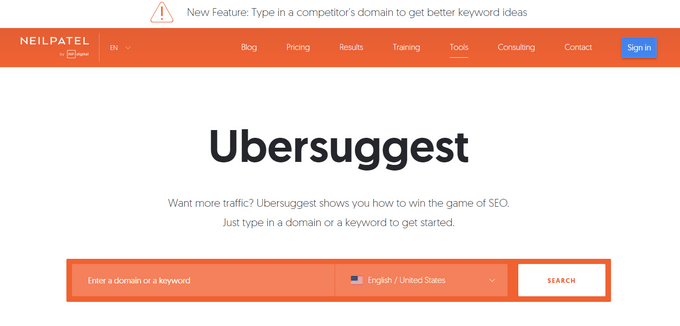
Ubersuggest is a free tool from Neil Patel that offers search volume data, keyword suggestions, an idea of how difficult your keyword will be to rank for (keyword difficulty), and more.
You can view lots of suggestions for related keywords that includes data like trend, volume, cost per click (CPC), paid difficulty, and SEO difficulty.
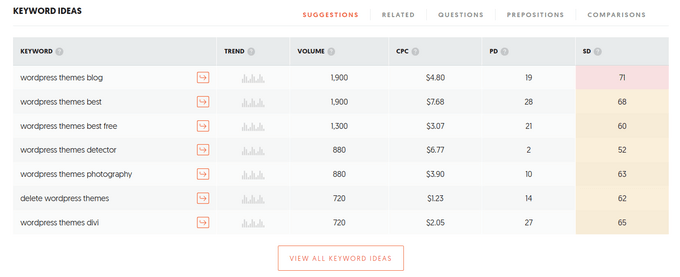
Under Content Ideas, it also shows content related to your keyword, listing estimated monthly visits, backlinks, and number of shares on Facebook, Pinterest, and Reddit.

If you sign into Ubersuggest with your Google account, then you’ll be able to get more keyword suggestions, daily rank tracking, and personalized SEO suggestions. Ubersuggest also comes with a Chrome extension that can help you improve your workflow.
What We Like About Ubersuggest:
- Simple and easy to navigate, making it accessible for beginners.
- Offers affordable pricing plans compared to premium tools like Semrush and Ahrefs.
- Provides keyword overview data, content ideas, and competitor analysis features.
- Continually adding new features and functionalities.
What We Don’t Like About Ubersuggest:
- Some users have questioned the accuracy of its keyword data compared to more established tools.
- The free plan is very limited in terms of daily searches and data access.
Why We Recommend Ubersuggest: We recommend Ubersuggest as a good all-around keyword research tool, especially for users who are looking for an affordable and user-friendly option.
6. Ahrefs

Ahrefs is another popular keyword research tool that offers similar features to SEMrush. Using Ahrefs keyword explorer, you can come up with keyword ideas simply by typing a keyword into the search box. You’ll then see a whole list of keyword suggestions.
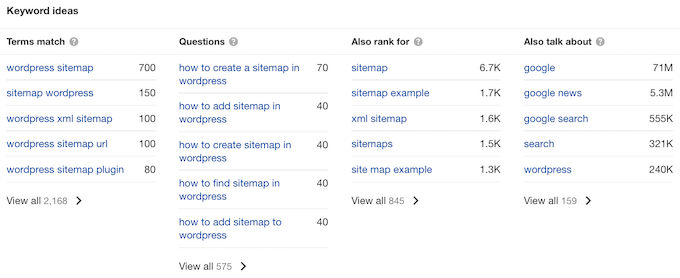
You can also use Ahrefs to see the keywords that your competitors are ranking for (but that you’re not), so you can create new content pieces targeting keywords related to those subjects.
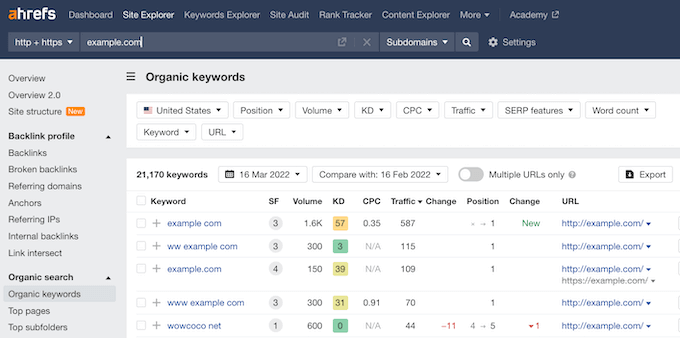
Another nice competitive intelligence functionality that Ahrefs offers is the ability to see new keywords and keyword movements in search queries.
Both Semrush and Ahrefs offer a bunch of other useful tools too, like reports that find broken links on your site, PPC keywords for Google Ads, and more.
What We Like About Ahrefs:
- Offers exceptional backlink analysis capabilities.
- Offers a wide suite of SEO tools, including keyword research, site audit, rank tracking, content explorer, and more.
- Has a very large and frequently updated index of web pages and backlinks, providing extensive data.
- Considered to have a highly reliable keyword difficulty score.
What We Don’t Like About Ahrefs:
- One of the most expensive SEO and keyword research tools.
- Can be overwhelming for beginners.
- While it has expanded its features, Ahrefs is still primarily known for backlink analysis.
Why We Recommend Ahrefs: We recommend Ahrefs as the top choice for SEO professionals, agencies, and large businesses that require the most comprehensive SEO data and backlink analysis capabilities.
7. Google Keyword Planner

Google’s Keyword Planner is really designed for use by advertisers who want to run their ads on Google. However it’s still a useful tool for SEO, and unlike other paid tools, this is free to use.
To access it, you’ll need a Google Ads account. If you don’t already have one, then you’ll need to create one and enter your payment details, but you don’t need to run an active campaign or pay for anything.
Once you’ve got access to the Keyword Planner through your Google Ads account, you can type in any keyword and view data for (very approximately) how many monthly searches it has.
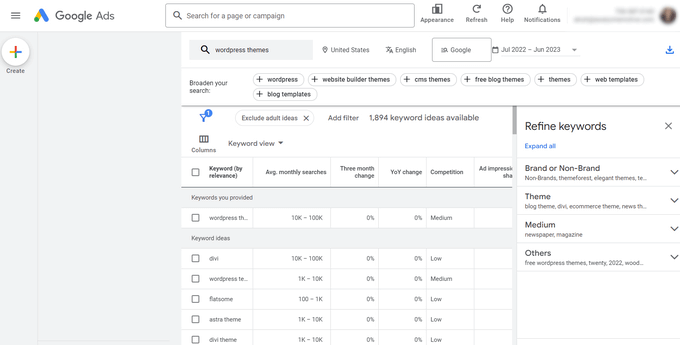
You’ll also see a long list of related keyword ideas, which you scroll through or download.
What We Like About Google Keyword Planner:
- Provides keyword data directly from Google, who actually produce the search results.
- Free to use for anyone with a Google Ads account.
- Offers search volume data, competition levels, and keyword suggestions.
What We Don’t Like About Google Keyword Planner:
- Data is primarily geared towards paid advertising, organic SEO metrics are less detailed.
- Keyword suggestions can sometimes be very broad and less specific for long-tail research.
- Has fewer competitor keyword analysis features compared to dedicated SEO tools.
Why We Recommend Google Keyword Planner: We recommend Google Keyword Planner as an essential free tool, especially for beginners and anyone running Google Ads campaigns. It’s the official source for Google’s own keyword data.
8. TopicRanker
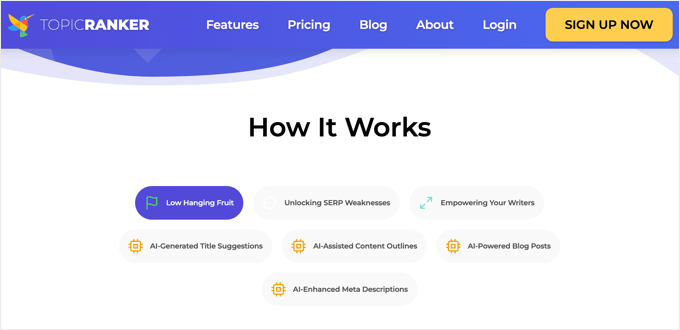
While tools like Semrush and Ahrefs focus on finding keywords with search volume data, TopicRanker takes a different approach.
Instead of listing raw keywords, TopicRanker analyzes the top-ranking content for a given keyword and identifies the subtopics, questions, and related terms that contribute to their success. This can show you the SEO strategy behind top-performing content.
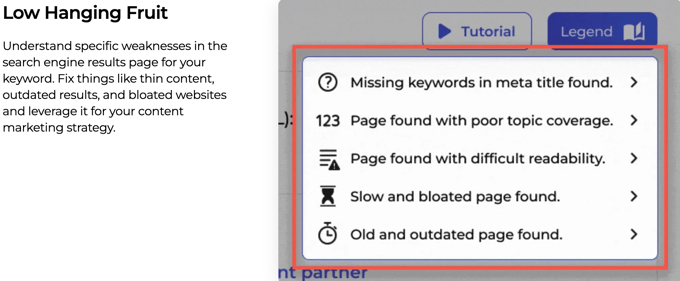
TopicRanker lets you see the best parts of your competitors’ content strategies and then helps you create comprehensive content that satisfies both search engines and users.
So it doesn’t just show you the keywords you can use, it gives you insights into how to structure your content, what subtopics to cover, and which related terms to include.
This makes it a tool that can complement other keyword research tools. You can use it to refine your content strategy, gain a competitive edge, and optimize your content for topical authority.
What We Like About TopicRanker:
- Uses AI to help identify and cluster related keywords and topics for content strategy.
- Can generate content briefs based on keyword clusters, aiding in content planning.
- Analyzes top-ranking content for target keywords, providing insights into content strategy.
- Offers a more modern and AI-driven approach to keyword research and content planning.
What We Don’t Like About TopicRanker:
- Being a newer tool, it may have less historical data and community support compared to established tools.
- Primarily focused on content strategy and topic clustering, it needs to be supplemented for broader keyword research.
Why We Recommend TopicRanker: We recommend TopicRanker for content marketers and strategists who are looking for an AI-powered tool to help with content planning and building topical authority.
Bonus: Serpstat

Serpstat is another excellent keyword research tool. You can use it to find new keyword ideas with information on volume, CPC, interest over time, and more.
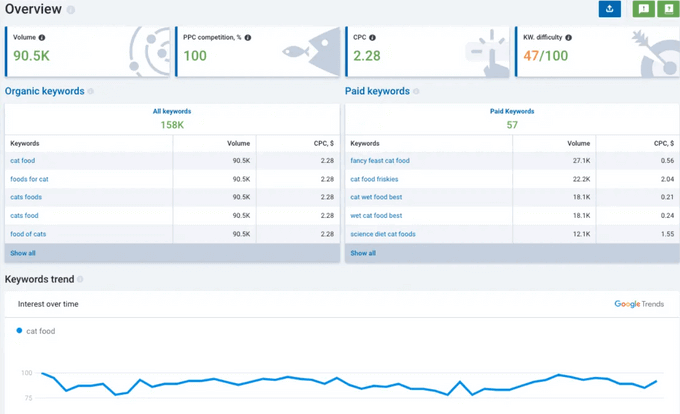
With Serpstat, you can easily view the top Google results for your keyword. These results include the site that appears in the featured snippet (if any) as the first result.
You can also view lots of details about your competitors for that keyword, with an indication of how visible they are (the higher the number here, the more visitors they likely receive).
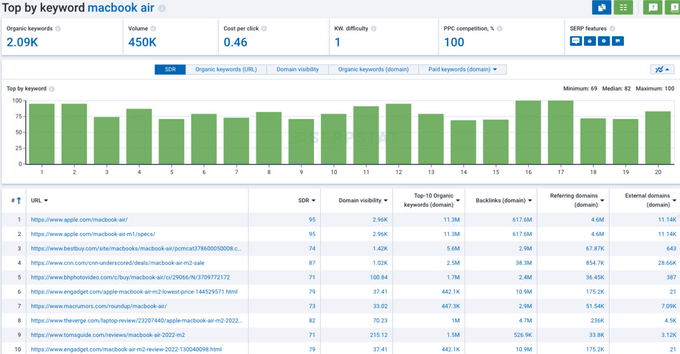
It also includes stats like backlinks, referring domains, and more.
What We Like About Serpstat:
- Offers a comprehensive suite of SEO tools, including keyword research, competitor analysis, rank tracking, site audit, and more.
- Offers more competitive pricing plans compared to Semrush and Ahrefs, making it a good mid-range option.
- Provides keyword data, competitor keyword research, and SERP analysis features.
What We Don’t Like About Serpstat:
- Some users find it less accurate than Ahrefs or Semrush in some areas.
- User interface is less polished than other tools.
- Customer support experiences can vary according to some user reviews.
Why We Recommend Serpstat: We recommend Serpstat as a strong all-in-one SEO platform that offers a good balance of features, data, and affordability. It’s a great alternative to more expensive tools like Semrush and Ahrefs.
Bonus: SpyFu
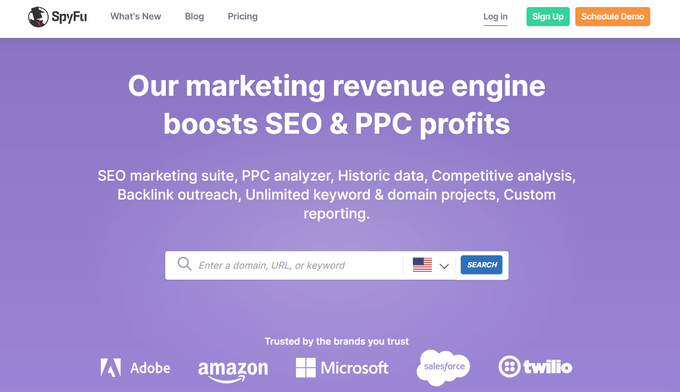
SpyFu is designed to let you learn from your competitors by digging into their most profitable keywords (and their ads too).
You can try it out for free, without even logging in. Just type the URL of the site you want to check into the search bar and you’ll see the results straight away. If you want to take a look at more than one site, then you’ll need to create a free account and log in.
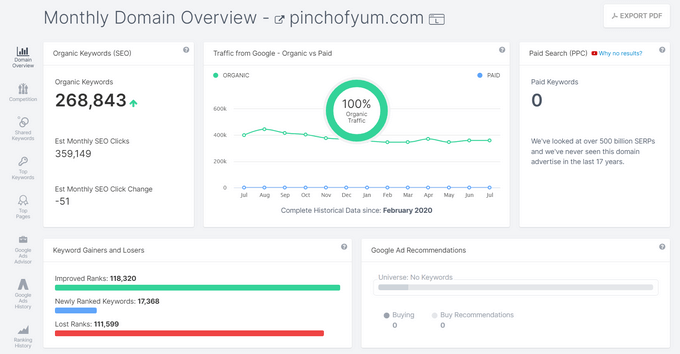
SpyFu collects past data, so you can see how your own site or your competitor’s site has fallen or risen in the rankings for particular keywords. You can also compare your site against other sites in your industry.
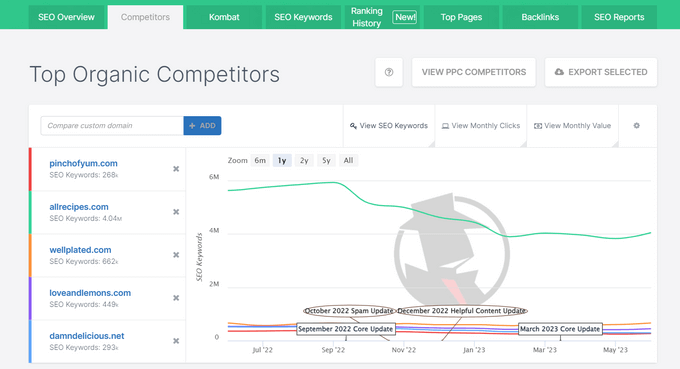
It includes stats like overlap, common keywords, number of keywords, monthly clicks, and more.
What We Like About SpyFu:
- Specifically excels at competitor keyword research, particularly for identifying competitor paid and organic keywords.
- Allows you to compare keyword profiles of multiple competitors.
- Offers historical keyword ranking data, allowing you to track keyword trends over time.
- Pricing is competitive, especially considering its strength in competitor analysis.
What We Don’t Like About SpyFu:
- While strong in competitor keyword analysis, it’s less of a full-suite SEO platform compared to tools like Semrush or Ahrefs.
- Some users find the interface to be less modern or intuitive compared to newer tools.
Why We Recommend SpyFu: We recommend SpyFu for users who are intensely focused on competitor keyword research and gaining a deep understanding of their competitors’ SEO and PPC strategies.
Which Is the Best Keyword Research Tool? (Expert Pick)
After trying out all the popular keyword research tools, we believe that Semrush is the best keyword research tool and the #1 SEO toolkit in the market.
We also highly recommend LowFruits, it’s the perfect tool for finding low-competition keywords that you can rank for.
If you’re looking for a free keyword research tool, then try out WPBeginner Keyword Generator or AnswerThePublic.
Whether you’re a blogger or have an eCommerce website, you must setup Google Analytics and connect Google Search Console to your website for your keyword strategy to work.
These tools help you see how your website is performing for specific keywords along with showing you the average CTR (click-through-rate) on your listing. You can tweak your title to boost CTR and further improve your keyword rankings.
We hope this article helped you find the best keyword research tools for SEO. You may also want to check out our guide on doing keyword research for tips on how best to carry out your research and put the results into practice.
If you liked this article, then please subscribe to our YouTube Channel for WordPress video tutorials. You can also find us on Twitter and Facebook.





Jiří Vaněk
Keyword research is important to me, but I first had to learn a lot about it from courses and articles like the ones here. I used Semrush, but I’m limited by the free account. Now that I’ve seen AIO SEO integrate Low Fruits, it gives me hope that this process will be easier for AIO SEO users, and I’ll be able to use integrated tools directly in my WordPress. Thanks, in any case, for showing other tools besides Semrush that can be used as alternatives.
Moinuddin Waheed
keyword research makes an important component of blogging journey specially to have organic traffic.
I have used many tools. Semrush is infact best among them but is paid and it becomes very difficult for any blogger just starting out to afford that tool.
Most of the people have reservations about the free tools.
are they accurate enough to rely on?
do they provide other options as well to scale?
WPBeginner Support
The free tools can still work for sites and some of the sites that offer a free version have a paid version that offers more insight.
Admin
Ahmed Omar
Although I am writing my content for long time
It is my first time to know about Google Keyword Planner, also I did not know about WPBeginner Keyword Generator
the post is very valuable and helpful
Thank you
WPBeginner Support
You’re welcome
Admin
Maria
Thank you for this article. I am a newbie trying to create my own website, and this was very helpful. I know more about SEO tools and the tools offered. Now that I am more knowledgeable, thanks to you, and can start my keyword searches for better content.
Thank you again.
WPBeginner Support
Glad you found our list helpful
Admin
Jennifer Duffy
Thank you so much for providing all of this excellent information in a very easy-to-understand format!
WPBeginner Support
You’re welcome
Admin